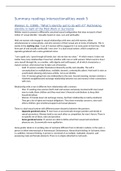Summary readings intersectionalities week 5
Wekker, G. (1999). “What’s identity got to do with it?” Rethinking
identity in light of the Mati Work in Suriname
Wekker wants to present a differently conceived sexual configuration that does not posit a fixed
notion of ‘sexual identity’. Sexuality based on class, race and spirituality.
Mati are women who engage in sexual relationships with men and with women, either
simultaneously or consecutively, and who conceive of their sexual acts in terms of behavior. This is
mainly in the working class. 3 out of 4 women will be engaged in it at some point in their lives. Mati
form part of and actually continually ‘cross over’ in a dual sexual system, which comprises an
opposite-gendered and a same-gendered arena.
“I am a gold coin, I pass through all hands, but I do not lose my value.” which means: it does not
matter how many relationships I have had, whether with men or with women. What counts is how I
carry myself through life, as a mother, with dignity and (self)respect, all of which characterize a
mature woman, who knows how to take care of business.
- Gold women consider themselves inherently worthy and valuable. The self is
conceptualized as multiplicitous, mallable, dynamic, contextually salient. Mati work is seen as
a particularly pleasing and joyous activity, not as an identity.
- Coin women going from one relationship to the next. Second meaning: women envision a
relatively straightforward exchange relationship between sex and money in their connections
with men.
Relationship with a man is different from relationship with a woman:
- Man working class women (both mati and women exclusively involved with men) need
men to make them children and they need men’s financial contributions to keep their
household afloat.
- Woman female lovers do exchange money, but their relationship is mainly emotional.
They got a lot of rights and mutual obligations. They share everyday concerns, raise each
others children, give emotional support and sexual pleasure.
There is a dual sexual system with different power dynamics between the partners:
- Opposite-gendered arena men have an economically stronger position and decide in
sexual encounters. Women tend to see each other as competitors for men’s favors. There is
no specific set of ideas, rules and practices
- Same-gendered arena women are able to define what their sexual and emotional
pleasures are. Economically more egalitarian.
Same gender desire is in working class in Suriname different from in Western nations. In the west, a
person is either heterosexual or homosexual. Dichotomous, hierarchical thinking. In Suriname, there
is a additive, inclusive thinking. A person is conceived of as multiple, malleable, dynamic, and
possessing male and female elements. There is no stigma attached to mati work.
, Ford, J. (2017). “Going with the flow”: How college men’s
experiences of unwanted sex are produced by gendered
interactional pressures
Research question: is it possible that interactional expectations are more important than fear in
pushing men toward unwanted sex?
Why men have unwanted sex:
1. Tendency to smooth interactional processes Goffman’s communicative morality of
interaction = the general rules about how one is supposed to conduct themselves during
interaction. This leads to men having unwanted sex because once a sexual encounter begins,
interactional pressures may make it difficult to stop the encounter without breaking general
rules (causing disruption or embarrassing someone).
o Safe face turning down a sexual opportunity may make a man lose face precisely
because he is a man. It can cause a embarrassing situation.
o Making sense to others doing what is expected. People generally conform to
what is expected and accomplish upholding a sense of social order in situ.
2. Gender norms if an attractive women provide an opportunity for sex, men should pursue
it because they are driven by sexual urges. Some men have unwanted sex because of their
fear that other men will stigmatize them if they do not.
Findings: Generic interactional processes + gender norms = unwanted sex
- Unwanted sex because it was easier than saying no
- Unwanted sex to smoothen interaction and not lose face
- Unwanted sex because of gendered expectations
- Overtly performing their masculinity through sex
In contrast to findings of other scholars, men did worry about what women thought about them.
Women may judge for not hooking up with them.
Three ways to avoid having sex and not lose face
1. If the woman was not attractive enough
2. If the woman was intoxicated
3. When an interaction was interrupted abruptly
Conclusion:
- Interactional processes (such as saving face and making sense) + gender norms = unwanted
sex
- Communicative morality is informed by gender norms. Gender neutral interactional
processes were not sufficient to explain unwanted sex. Instead gender specific interactional
processes.
- Women have more power than is otherwise understood because women’s accounts have
consequences for men’s sense of self. Men also believe that women’s reports of the
interaction will be credible to others.
- Men had unwanted sex by their own volition, so they didn’t frame these encounters as
sexual assault.
D’Emilio, J. (1983). Capitalism and gay identity.
The myth of the eternal homosexual isn’t true. Homosexuals have not always existed according to
D’Emilio. They are a product of capitalism.




